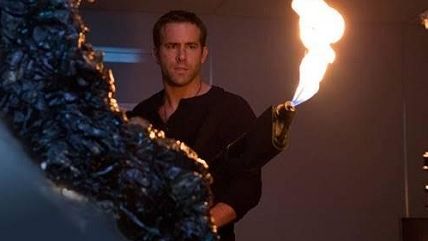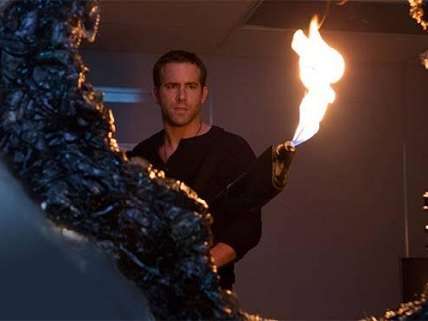Movie Review: Self/Less
Ben Kingsley trades up to Ryan Reynolds' body, with muddled results.


The new sci-fi movie Self/Less poses a pressing question: why did Tarsem Singh want to make this picture? Singh, the director who demonstrated such a spectacular visual gift in films like The Cell (2000) and especially The Fall (2006), here delivers a movie that looks as if it were shot, by turns, in an auto showroom, an ICU ward, and a grassy field. There are also a few deluxe environments (New York's Four Seasons restaurant, the peerlessly garish Trump Tower hotel), but the director presents them as-is, with none of the surreal fantasy embellishments of which he's capable. The picture is a waste of his talent and our time.
This is a body-swap movie just barely unlike the old John Frankenheimer film Seconds. The premise is still intriguing. Damian Hale (Ben Kingsley), a real-estate mogul dying of cancer, is given the business card of a company called Phoenix Biogenix, which, for a hefty price, will transfer Hale's consciousness into a healthy young body created in the Phoenix lab. The company's CEO, a chilly character named Albright (Matthew Goode), depicts this trans-human undertaking as a service to humanity: "Just think of all the great minds we've lost, just because their bodies failed them."
But wait a minute. How does a cut-throat businessman like Hale qualify as a "great mind"? And why would a company as secretive as Phoenix be in the habit of handing out business cards? These are puzzles that go unaddressed. But we play along, and it's fun for awhile.
Hale is dispatched to New Orleans, where he fakes his own death and is then wheeled into an OR where, after some spinning-light effects, he wakes up in the body of Ryan Reynolds. Not a bad deal. There is a slight problem: violent hallucinations in which the face of a little girl figures. But Albright produces a bottle of red pills that he says will keep these mental eruptions under control.
The former Damian Hale is then given a new name (Eddie) and a new backstory, with accompanying ID and cash-packed bank account. He is installed in a new life, which includes a fabulous mansion and top-of-the-line sports car. He begins picking up chicks in the company of a mysterious new friend named Anton (Derek Luke). Life is good again.
But then another hallucination breaks through, with enough visual information to lead Eddie to a small house in St. Louis, where he encounters a woman named Madeline (Natalie Martinez) and the little girl of Eddie's tumultuous dreams. Just as he's figuring out what's really going on, the house is attacked by heavily armed Phoenix operatives, who've had Eddie under surveillance.
Here, Singh makes the mistake of trying to turn the story away from sci-fi speculation and into an action movie, a genre for which he has no special facility. There's an awful lot of fighting and shooting and flame-throwing, but those things alone, unenhanced by imaginative staging and energetic editing, do not constitute "action," only noise. There's also a long car-chase sequence into which a lot of effort was surely put, but it's nevertheless generic.
As Eddie (or Mark, as he's now called, having sustained a second name-change) makes his way back toward a big-reveal confrontation with Albright, we ponder the movie's other problems. Why does Reynolds' character, a dull fellow, share no colorful residual traits with the departed Damian Hale? Why is the headquarters of Phoenix—a company that charges $250-million per body job—located in a warehouse used for storing Mardi Gras floats? And why did Singh and his sibling writers, David and Àlex Pastor, feel the need to stir in a wispy subplot, of minimal interest, involving Hale's estranged daughter (Michelle Dockery, of Downton Abbey)? None of these questions are resolved. But then by the end, we've lost interest in asking them.
Editor's Note: As of February 29, 2024, commenting privileges on reason.com posts are limited to Reason Plus subscribers. Past commenters are grandfathered in for a temporary period. Subscribe here to preserve your ability to comment. Your Reason Plus subscription also gives you an ad-free version of reason.com, along with full access to the digital edition and archives of Reason magazine. We request that comments be civil and on-topic. We do not moderate or assume any responsibility for comments, which are owned by the readers who post them. Comments do not represent the views of reason.com or Reason Foundation. We reserve the right to delete any comment and ban commenters for any reason at any time. Comments may only be edited within 5 minutes of posting. Report abuses.
Please to post comments


but there is a flamethrower? Is this a species reboot?
I can't seem to find the Friday Funnies. Going to start shaking soon. What's going on?
As for the movie... I might go see it if I were completely bored one Sat/Sun afternoon.
Heeeeeeeey, this is a libertarian website! Don't insult cut-throat businessmen like that; we worship them around here!
Your criticism of the article is valid: the comment was stupid because it accepts the notion that the government should identify "great minds" and save them independent of their financial situation. Yes, Hale can pay for the procedure, which is why he should be able to get it. Any other rule is wrong and dangerous.
If you look at our own government, our powerful bureaucrats and politicians already receive the best medical care in the country. You can bet that the FDA will be more amendable to making exceptions if asked by top administration officials. Of course, politically well-connected businessmen are part of that ruling elite too. Socialist, communist, fascist, and theocratic societies, kick that up a notch.
If such procedures are reserved for "great minds", the ruling elite may decide to serve a few Hawkings for show, but you can bet that the Dick Cheneys, Barack Obamas, and George Soroses of this world would get themselves new bodies. And they'd come up with ways of procuring those bodies.
Thanks, but I'll take "you get the medical procedure if and only if you can pay for it" over that kind of corruption any day. People are free to donate to save someone's mind, but that should be a voluntary decision. I'd donate some money to save Hawking because he seems worth saving (even though I can't actually stand the guy). I strongly object to government making that decision for me.
the comment was stupid because it accepts the notion that the government should identify "great minds" and save them independent of their financial situation
Wait, what??
Think it through step by step:
This rhetorical question already concedes much of the premise, namely that "great mind" is a valid concept, and that it is different from simply having wealth. So, if the determination of whose mind is going to be saved isn't made by voluntary financial transactions (i.e., the market, including charity), who is left to make those decisions other than government?
Seems to me a libertarian should reject the very concept of a "great mind" as a universally valid judgment of the value of a human being; what's great to some people may not be great to others. A libertarian should indeed want the saving of minds to be determined by financial resources, which may, of course, include massive voluntary donations for saving people like Hawkings.
"who is left to make those decisions other than the government?"
the inventor of the technology (at least until it is replicated). a charity. a NGO. a trust. i could easily imagine a charity growing from small donations of large numbers of not-wealthy people to preserve beloved intellectual figures. nothing about any of those things conflicts with libertarianism, which is not the same as corporatism.
the dichotomy of state vs entrepeneur is over simplistic.
Those are all market participants: they are private actors using their own resources voluntarily.
The dichotomy is between government action vs. private action, aka the free market.
It's the movie that posits the concept of "great minds." I'm just reviewing it.
True, but your review brings your own biases to the table, and I'm trying to make you aware of them. There are many other things you could have written, like:
Thanks for the wake-up call. Will try to inject a little more pomposity into my writing...
As is so rarely the case in real life, government plays no part in this story. The Phoenix CEO is presented as an idealist who seeks only to prolong the existence of "great minds." There's no suggestion of corruption of this mission. The ability of Kingsley's character to avail himself of the company's service is just an old-fashioned plot flaw -- one of the movie's many.
POLITICAL TALKING POINTS WILL BE REPEATED WHETHER YOU LIKE IT OR NOT MR LODER. After all, we are libertarians, so we believe that politics is part of everything, even art and movies. Right?
Well, this is a movie review for a libertarian political web site. It seems reasonable to look both at the movie and the review from a libertarian point of view.
And the notion that the population can be divided into "greater" and "lesser" minds and that the "great minds" are worthy of preserving has some deep political connections with anti-libertarian ideologies like progressivism.
So, yeah, I think it's worth reflecting on this particular aspect a bit more, where definitions of "great minds" come from, etc.
No...
*This is a body-swap movie just barely unlike the old John Frankenheimer film Seconds. *
THAT movie is a classic. Save yourself the aggravation and just go watch that film instead of this dreck.
Tarsem Singh is like an Indian-American M. Night Shyamalan. Oh, wait... Well, they both suck too.
No kidding. I'm surprised that anyone would want to claim a film like "The Cell" on their resume. That was a total piece of dogshit.
Self/Less is a body-swap movie and it's very interesting.it is unlike the old John Frankenheimer film Seconds.